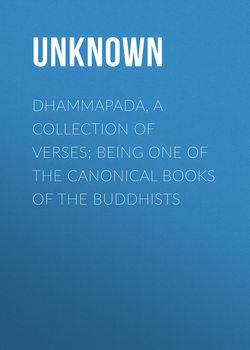Читать книгу Dhammapada, a Collection of Verses; Being One of the Canonical Books of the Buddhists - Unknown - Страница 6
Chapter VI. The Wise Man (Pandita)
Оглавление76. If you see an intelligent man who tells you where true treasures are to be found, who shows what is to be avoided, and administers reproofs, follow that wise man; it will be better, not worse, for those who follow him.
77. Let him admonish, let him teach, let him forbid what is improper!—he will be beloved of the good, by the bad he will be hated.
78. Do not have evil-doers for friends, do not have low people for friends: have virtuous people for friends, have for friends the best of men.
79. He who drinks in the law lives happily with a serene mind: the sage rejoices always in the law, as preached by the elect (Ariyas).
80. Well-makers lead the water (wherever they like); fletchers bend the arrow; carpenters bend a log of wood; wise people fashion themselves.
81. As a solid rock is not shaken by the wind, wise people falter not amidst blame and praise.
82. Wise people, after they have listened to the laws, become serene, like a deep, smooth, and still lake.
83. Good people walk on whatever befall, the good do not prattle, longing for pleasure; whether touched by happiness or sorrow wise people never appear elated or depressed.
84. If, whether for his own sake, or for the sake of others, a man wishes neither for a son, nor for wealth, nor for lordship, and if he does not wish for his own success by unfair means, then he is good, wise, and virtuous.
85. Few are there among men who arrive at the other shore (become Arhats); the other people here run up and down the shore.
86. But those who, when the law has been well preached to them, follow the law, will pass across the dominion of death, however difficult to overcome.
87, 88. A wise man should leave the dark state (of ordinary life), and follow the bright state (of the Bhikshu). After going from his home to a homeless state, he should in his retirement look for enjoyment where there seemed to be no enjoyment. Leaving all pleasures behind, and calling nothing his own, the wise man should purge himself from all the troubles of the mind.
89. Those whose mind is well grounded in the (seven) elements of knowledge, who without clinging to anything, rejoice in freedom from attachment, whose appetites have been conquered, and who are full of light, are free (even) in this world.
